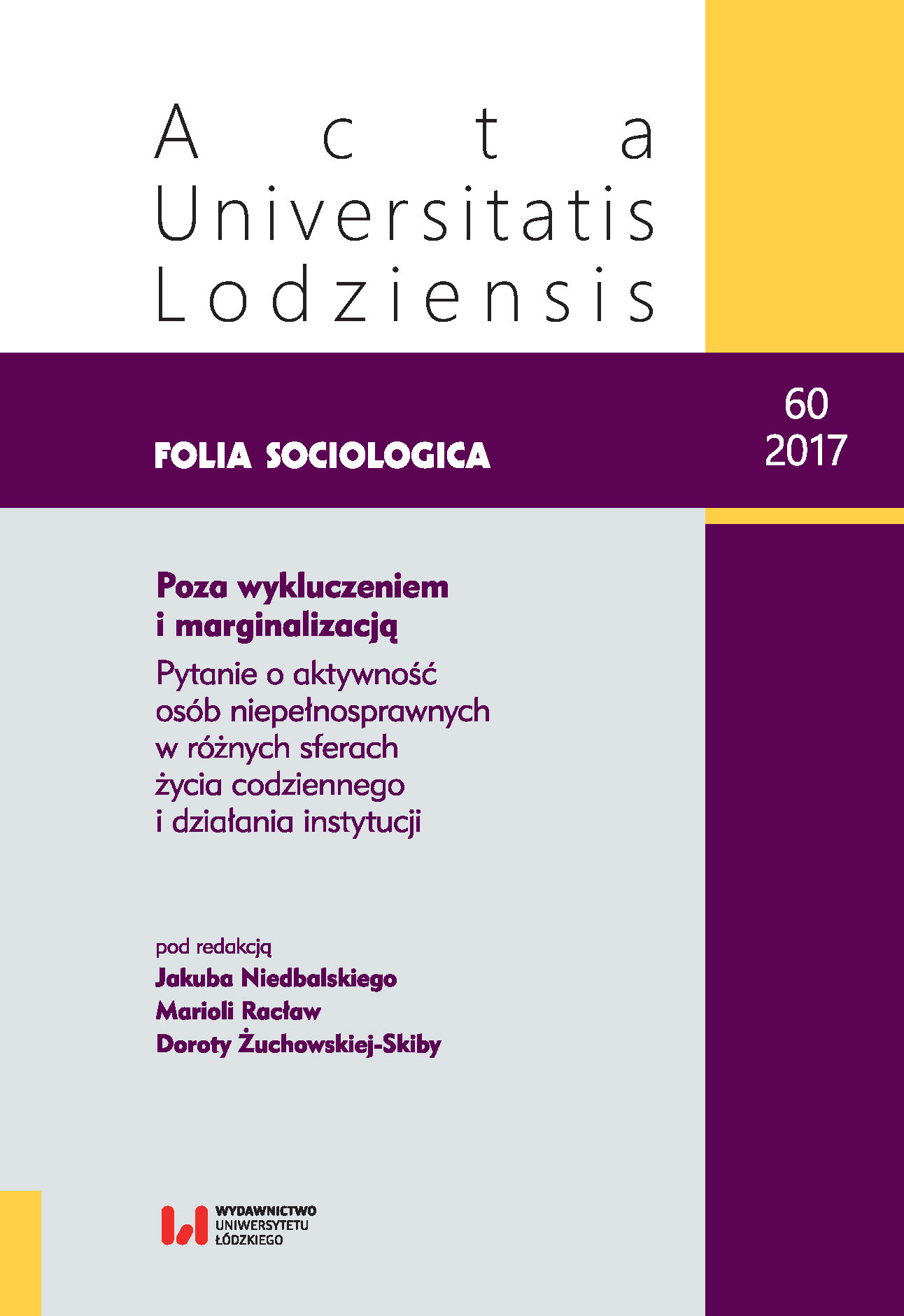The dynamics of social networks of people with disabilities in contemporary Polish society
DOI:
https://doi.org/10.18778/0208-600X.60.10Keywords:
disability, automarginalisation, social networks, integration, marginalizationAbstract
Demonstrating the social situation of the people with disabilities requires determining their position in relation to the rest of society, which makes it necessary to compare the relationships of people with disabilities and people without them. Adopting this perspective makes it possible to reflect and capture the structure of social networks of the people with disabilities. This helps to show the factors hindering the integration of this category with society and to show the dynamics which they are subjected to. The analysis of this phenomenon enables the use of network theory, which serves as a tool of re-creating and multi-dimensional analysis of the dynamic network of social relations, essential in demonstrating the degree of marginalization of people with disabilities.
The main aim of the article is to describe the characteristics of social networks of the people with disabilities, which will help to re-create the processes happening within them as well as identify the factors that reinforce the marginalization of this category and hinder its full integration with society. For this purpose, the analysis of existing data from the Social Diagnosis 2011 and 2015 has been applied, which enabled to examine the structure of social networks of people with disabilities.
References
Bartkowski J. (2014), Położenie społeczno-ekonomiczne i jakość życia osób niepełnosprawnych w Polsce, [w:] B. Gąciarz, S. Rudnicki (red.), Polscy niepełnosprawni. Od kompleksowej diagnozy do nowego modelu polityki społecznej, Wydawnictwa Akademii Górniczo-Hutniczej, Kraków, s. 45–104.
Google Scholar
Bartkowski J., Gąciarz B. (2014), Położenie społeczno-ekonomiczne niepełnosprawnych w Polsce na tle sytuacji osób niepełnosprawnych w krajach Unii Europejskiej, „Niepełnosprawność – Zagadnienia, Problemy, Rozwiązania”, nr 2 (11), s. 20–43.
Google Scholar
Blau P. (1994), Structural Contexts of Opportunities, University of Chicago Press, Chicago.
Google Scholar
Czapiński J., Panek T. (2015), Diagnoza Społeczna 2015. Warunki i jakość życia Polaków, http://ce.vizja.pl/en/issues/volume/9/issue/4 [dostęp: 2.09.2016].
Google Scholar
Diagnoza Społeczna. Zintegrowana baza danych (2016), http://www.diagnoza.com [dostęp: 16.09.2016].
Google Scholar
Frieske K. (1999), Marginalność społeczna, [w:] Encyklopedia socjologii, t. 2, Oficyna Wydawnicza, Warszawa, s. 167–171.
Google Scholar
Germani G. (1980), Marginality, Transaction Books, New Brunswick.
Google Scholar
Granovetter M. S. (1983), The strength of weak ties: A network theory revisited, “Sociological Theory”, No. 1, s. 201–233.
Google Scholar
Zawisza K., Gałaś A., Tobiasz-Adamczyk B. (2014), Polska wersja Courage Social Network Index – skali do oceny poziomu sieci społecznych, „Gerontologia Polska”, nr 1 (22), s. 31–41.
Google Scholar
Ostrowska A., Sikorska J., Sufin Z. (1994), Sytuacja ludzi niepełnosprawnych w Polsce, Wydawnictwo Instytutu Filozofii i Socjologii PAN, Warszawa.
Google Scholar
Ostrowska A., Sikorska J. (1996), Syndrom niepełnosprawności w Polsce. Bariery integracji, Wydawnictwo Instytutu Filozofii i Socjologii PAN, Warszawa.
Google Scholar
Putnam R. (2008), Samotna gra w kręgle, Wydawnictwa Akademickie i Profesjonalne, Warszawa.
Google Scholar
Scott J. (2000), Social Network Analysis. A Handbook, Sage Publications, London.
Google Scholar
Turner J., Maryanski A. (2004), Analiza sieciowa, [w:] J. Turner, Struktura teorii socjologicznej, Wydawnictwo Naukowe PWN, Warszawa, s. 604–614.
Google Scholar
Wasserman S., Faust K. (1994), Social Network Analysis: Methods and Applications, Cambridge University Press, New York.
Google Scholar
DOI: https://doi.org/10.1017/CBO9780511815478
Woźniak Z. (2008), Niepełnosprawność i niepełnosprawni w Polskiej polityce społecznej. Społeczny kontekst medycznego problemu, Wydawnictwo SWPS Academica, Warszawa.
Google Scholar
Wysieńska K. (2010), Integracja, stygmatyzacja, autosegregacja, tożsamość, preferencje i wzory relacji imigrantów w Polsce, Instytut Spraw Publicznych, Warszawa.
Google Scholar
Downloads
Published
How to Cite
Issue
Section
License

This work is licensed under a Creative Commons Attribution-NonCommercial-NoDerivatives 4.0 International License.










